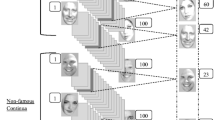Summary
Most recent work concerned with intuition has demonstrated that people can respond discriminatively to coherence that they cannot identify. Specifically, in a gestalt-closure task subjects were shown slides of paired drawings. One of the drawings represented a fragmented picture of a common object, whereas the other was constructed by rotation of the elements of the coherent gestalt. When the subjects were unable to name the object, they were urged to make a forced-choice decision regarding which of the two drawings represented a real object. The results showed that the proportion of pictures not correctly identified, that were nevertheless correctly selected as coherent, was significantly higher than chance. The current experiment replicated these findings. In addition, it was shown that a study phase with either coherent or incoherent picture primes can bias intuitive judgments in the test phase in accordance with a processing view. Incoherent-picture primes reduced the forced-choice decisions to a level of chance. Moreover, priming was found to be dependent on the similarity between the study and the test stimuli. We argue that a more fluent reprocessing of coherent, or primed, stimuli may be a basis for intuitive judgments. Intuition may go wrong when priming has favored an incoherent solution.
Similar content being viewed by others
References
Bowers, K. S., Regehr, G., Balthazard, C., & Parker, K. (1990). Intuition in the context of discovery. Cognitive Psychology, 22, 72–110.
Graf, P., & Mandler, G. (1984). Activation makes words more accessible, but not necessarily more retrievable. Journal of Verbal Learning and Verbal Behavior, 23, 553–568.
Jacoby, L. L., Allan, L. G., Collins, J. C., & Larwill, L. K. (1988). Memory influences subjective experience: Noise judgments. Journal of Experimental Psychology: Learning, Memory, and Cognition, 14, 240–247.
Jacoby, L. L., & Kelley, C. M. (1987). Unconscious influences of memory for a prior event. Personality and Social Psychology Bulletin, 13, 314–336.
Johnston, W. A., Hawley, K. J., & Elliott, J. M. (1991). Contribution of perceptual fluency to recognition judgments. Journal of Experimental Psychology: Learning, Memory, and Cognition, 17, 210–223.
Kahneman, D. S., Slovic, P., & Tversky, A. (Eds.). (1982). Judgment under uncertainty: Heuristics and biases. Cambridge: Cambridge University Press.
Reichenbach, H. (1938). Experience and prediction. Chicago: University of Chicago Press.
Roediger, H. L., Weldon, M. S., & Challis, B. H. (1989). Explaining dissociations between implicit and explicit measures of retention: A processing account. In H. L. Roediger & F. I. M. Craik (Eds.), Varieties of memory and consciousness (pp. 3–14). Hillsdale, NJ: Erlbaum.
Schacter, D. L., Delaney, S. M., & Merikle, E. P. (1990). Priming of nonverbal information and the nature of implicit memory. In G. H. Bower (Ed.), The Psychology of Learning and Motivation, Vol. 26 (pp. 83–123). New York: Academic Press.
Witherspoon, D., & Allan, L. G. (1985). The effect of a prior presentation on temporal judgments in a perceptual identification task. Memory & Cognition, 13, 101–111.
Author information
Authors and Affiliations
Rights and permissions
About this article
Cite this article
Wippich, W. Intuition in the context of implicit memory. Psychol. Res 56, 104–109 (1994). https://doi.org/10.1007/BF00419717
Received:
Accepted:
Issue Date:
DOI: https://doi.org/10.1007/BF00419717




